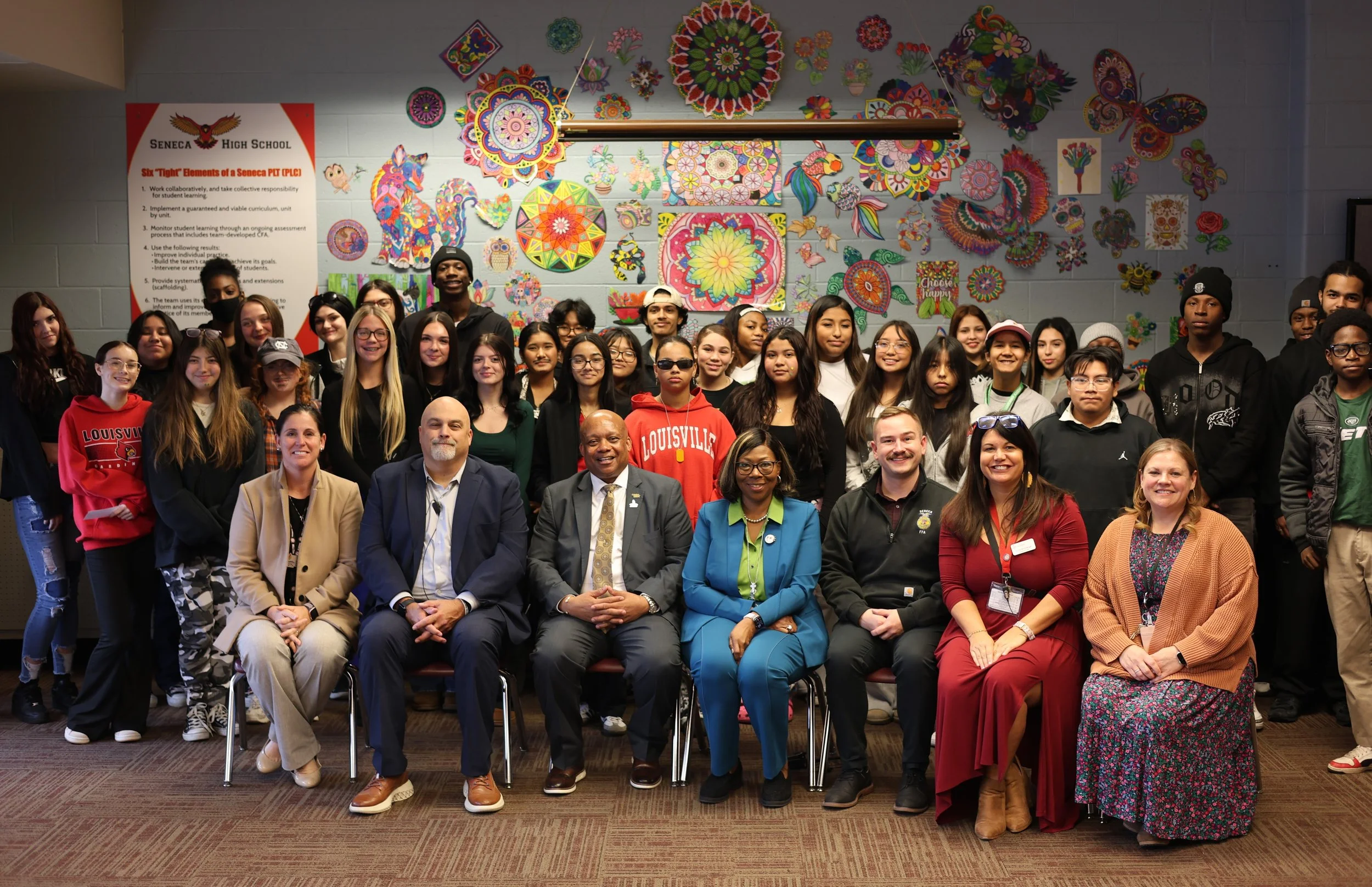From International Athlete to Superintendent: Dr. Yearwood's Trajectory to Education Leadership
For JCPS Superintendent Dr. Brian Yearwood, his initial path was clear: becoming a geologist in oil-rich Trinidad and Tobago after an impressive run as an international athlete. However, a profound personal connection fundamentally rerouted his future—a pivotal moment he recounted to Seneca High School's Teaching & Learning students on October 28th.
While a college student, a chance interaction with a single, non-verbal student compelled him to choose service over science. He told the aspiring educators, "I changed my trajectory, my future, from going into geology and going to search for oil, into education." This powerful pivot demonstrates that the greatest professional paths often emerge from a calling to connect and serve.
The Defining Shift: Finding Vocation Through Service
Dr. Yearwood's professional ambition was not initially in education. A talented athlete from Trinidad and Tobago, he came to the United States to pursue his education, earning degrees and playing national-level tennis at the New Mexico Military Institute and Texas Tech University. His post-graduate plan was to return home as a geologist, leveraging his nation’s oil and natural gas wealth—a path encouraged by his good friend, Dr. Keith Rowley (who would later become the Prime Minister of Trinidad and Tobago).
However, while fulfilling a volunteer commitment, a chance encounter with a young man who was non-verbal and relied on eye movements for communication immediately redefined his purpose. He stated, "Because of that interaction, I changed my trajectory, my future, from going into geology and going to search for oil, into education. What I truly enjoyed was taking a student that didn't really care, didn't really want to be there, and watching them grow."
He transitioned immediately to pursue a degree in teaching, quickly becoming a Physical Science teacher specializing in chemistry and physics. This moment affirms that the teaching profession is, at its core, a vocation driven by the capacity for deep human connection and service.
Pillars of Effective Pedagogy
Sharing the lessons from his own professional journey, Dr. Yearwood provided the students essential advice on establishing a highly effective and transformative learning environment. He emphasized that the greatest teaching strategy is engagement built on authentic relationships.
Prioritize Fun and Inquiry: Dr. Yearwood stressed that the classroom must be an active, enjoyable place, not simply a venue for "sit down, take notes, take a test." His science class leveraged dramatic demonstrations, like a professor who used a bowling ball on a bed of nails to explain pressure and surface area, to foster true intellectual curiosity.
"Getting students to want to know what it is you're doing is also very important."
Master Relationship Building: The most crucial element, Dr. Yearwood noted, is the intentional effort to know each student as an individual. This goes beyond the subject matter and extends to the family unit, establishing mutual respect and trust.
"I got to know each student in my classroom. I would call their parents. Students loved coming to my classroom."
He also advised embracing one's own background, stating that if you are multilingual or not originally from the area, you must embrace that difference, as students are naturally curious and this opens avenues for connection and cultural exchange.
Embrace Classroom Management and Discipline: His success in managing the classroom—or "classroom management," as a section of pedagogy—is what first drew him into administration. He explained that effective control allows a teacher to meet the higher challenge: changing a student's trajectory.
"A challenge is good as long as you know how to react to it. I look forward to that. If a young man and young woman were having difficulties and disrupting the class, my interaction with them would change their trajectory."
The Ascent of Leadership
The success Dr. Yearwood found in the classroom by making learning fun and connecting with even the most challenging students, did not go unnoticed. After just three years of teaching, his local superintendent recruited him for a role in administration based on his command of pedagogy and classroom management.
His first leadership challenge was as an Assistant Principal, a role he admitted he had no intention of taking but one that demanded immediate mastery of high-stakes discipline. It required great endurance and taught him the level of control necessary to manage an entire school. He recounted, "When I became the assistant principal, I was able to endure a lot of things. You have to embrace new learning."
His subsequent moves were driven by a desire to take on greater responsibility. He became an Elementary School Principal, intentionally choosing a Title I school that was considered "failing." After just one year, his leadership, coupled with the work of dedicated teachers, successfully turned the school around, elevating it to one of the highest-performing schools in the area. After twelve years there, he took on the challenge of a Middle School Principalship, turning that school around as well.
The mindset required for these administrative ascents, he emphasized, starts in the classroom: "You have to look forward to these challenges. You have to know, 'Hey, I welcome a challenge.' As a teacher, I welcome being able to outmaneuver a young man or young woman to get them on the right trajectory in a good way."
After demonstrating success across all school levels, Dr. Yearwood sought new opportunities to broaden his impact, which led him to apply to JCPS. His track record of transforming school communities and his student-first philosophy secured his role as a district leader.
He ultimately concluded his address by linking his path—from a student in the Caribbean to a district superintendent in the United States—directly to the potential of every student in the room: “Any one of you sitting in this room today can elevate to that level. Any one of you can become an excellent teacher.”
His core message to the next generation of educators is a powerful affirmation: The capacity for extraordinary impact and leadership resides within them.


